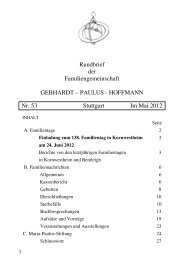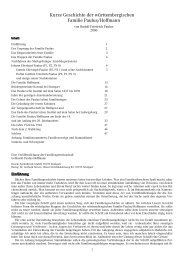Rundbrief der Familiengemeinschaft GEBHARDT – PAULUS ...
Rundbrief der Familiengemeinschaft GEBHARDT – PAULUS ...
Rundbrief der Familiengemeinschaft GEBHARDT – PAULUS ...
Sie wollen auch ein ePaper? Erhöhen Sie die Reichweite Ihrer Titel.
YUMPU macht aus Druck-PDFs automatisch weboptimierte ePaper, die Google liebt.
Hard times followed the end of the war. Thea completed her secondary<br />
education but her hopes for a university education and a career in medicine<br />
were impossible to realise. So, she turned to secretarial studies, where<br />
there were reasonable prospects of getting work. She learnt English and<br />
French as well as Accounting, and found employment as a business<br />
secretary in Ilmenau. However, as the Depression set in, many businesses<br />
folded and it became increasingly difficult to find permanent employment.<br />
Not wanting to become a financial burden on her family, she decided in the<br />
early1930s, to follow a close school friend to Palestine, where she worked<br />
as a nanny for the family of a British Army officer. In current times, it is not<br />
unusual for a young single woman to travel overseas on her own, but then,<br />
travelling alone from Germany to the Orient by train and boat was not<br />
without its risks, not to mention the challenges of establishing oneself in a<br />
foreign land. Thea’s parents viewed her plans with justifiable concern, and<br />
had visions of her disappearing into a Middle Eastern harem forever!<br />
In Palestine, Thea was soon introduced to the German Templer community<br />
of Jaffa/Sarona, which was already well-established. She did her banking<br />
at the Templer Bank, and it was there that a bank officer, Max Frank,<br />
noticed the young German woman who regularly came in as a customer. In<br />
the tightly knit Templer community, she stood out as a newcomer, if for no<br />
other reason that she didn’t speak the Templer Schwäbisch but rather,<br />
proper High-German.<br />
Eventually, Max and Thea were introduced to each other by mutual friends<br />
and in 1934 they were married. Their first child, Ilse, was born in 1936,<br />
followed by Walter in 1938, and Eberhard in 1940. By the time Walter was<br />
born, the political situation in Europe had started to destabilise and in<br />
Palestine itself, the early stages of Jewish-Arab conflict began to surface.<br />
The German communities increasingly found themselves threatened by<br />
these events. With the outbreak of World War II, most of the German men<br />
still in Palestine <strong>–</strong> husbands and fathers <strong>–</strong> were interned as enemy aliens<br />
by the British. Without Max, Thea had to care for her three young children<br />
by herself, within the confines of the village of Sarona, which itself was<br />
surrounded by barbed wire, and guarded by the British Army.<br />
In 1941, at very short notice, the Templers were told to pack their<br />
belongings and prepare to leave their homes. They were to be deported to<br />
an unnamed destination. Thea packed what she could carry, and prepared<br />
her children for the transport. It was to be no adventure. At least she was to<br />
be reunited with her Max. Onboard the original RMS Queen Elizabeth, a<br />
passenger liner, which had been converted to carry troops to war, they<br />
were taken into the unknown, across the Indian Ocean until they eventually<br />
reached Australia. The journey was dangerous and the Queen Elizabeth<br />
steamed at full speed to avoid potential attacks by German submarines or<br />
Japanese warplanes. They disembarked in Sydney and travelled by train to<br />
21







